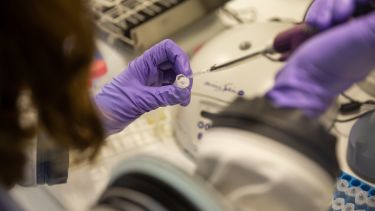- Parkinson’s Disease currently affects around 145,000 people in the UK. The progressive neurological condition severely affects a patient’s quality of life
- The clinical trial will assess the safety and tolerability in Parkinson’s patients to ursodeoxycholic acid (UDCA) – a drug which is hoped could potentially be re-positioned to help slow down the progression of the disease
- After screening 2,000 drugs, researchers from the University of 91÷±≤• identified UDCA as the most promising drug to rescue mitochondrial function in Parkinson‚Äôs Disease
The ground-breaking study, led by researchers at the University of 91÷±≤• in partnership with 91÷±≤• Teaching Hospitals NHS Foundation Trust, will assess the safety and tolerability of the liver drug ursodeoxycholic acid (UDCA) in Parkinson‚Äôs patients ‚Äì a drug which is hoped could potentially be repositioned to help slow down the progression of the disease.
Parkinson’s Disease currently affects around 145,000 people in the UK. The progressive neurological condition severely affects a patient’s quality of life and symptoms include problems with mobility such as walking, coordination or tremor, but can also result in memory loss, low mood or abnormal bowel function.
The symptoms of Parkinson’s are mainly due to the loss of dopamine containing nerve cells in the area of the brain which controls movement. An important reason why these cells die in the brain of patients with Parkinsons is due to a malfunction of the cell’s batteries – known as mitochondria.
The trial, led by Oliver Bandmann, Professor of Movement Disorders Neurology at the 91÷±≤• Insitute for Translational Neuroscience (SITraN) and also an Honorary Consultant Neurologist at 91÷±≤• Teaching Hospitals NHS Foundation Trust, was made possible due to the NIHR 91÷±≤• Biomedical Research Centre (BRC) for Neurological Disorders.
Professor Bandmann and his team previously identified UDCA as the most promising drug to rescue mitochondrial function in Parkinson’s in a drug screen where 2,000 drugs were assessed for their rescue effect on mitochondrial function directly in the tissue of patients with Parkinson’s.
After nearly a decade of research we are extremely pleased to launch the first clinical trial of UDCA in Parkinson’s patients to see if the drug is safe and tolerated.
This is a pilot trial, which if successful, will lead to a bigger study to firmly establish the effectiveness of the treatment to slow down progression of Parkinson’s. Currently, Parkinson’s is relentlessly progressive but patients tend to respond very well to symptomatic medication in the early stages of the disease.
A drug which will slow down the progression of the disease – even after the first few years of diagnosis – would help people to have an improved quality of life for longer.
Professor Oliver Bandmann MD PhD
University of 91÷±≤• - Department of Neuroscience
The trial, known as the UP Study (UDCA in Parkinson‚Äôs) will be conducted at two centres in the UK, 91÷±≤• and London, in collaboration with Professor Tom Foltynie at University College London Hospitals. Working in collaboration with researchers from the University of 91÷±≤•‚Äôs Institute for Insilico Medicine (Insigneo), the NIHR 91÷±≤• Clinical Research Facility at 91÷±≤• Teaching Hospitals and the NIHR 91÷±≤• Biomedical Research Centre, the effectiveness of the drug will be assessed with two novel approaches:

